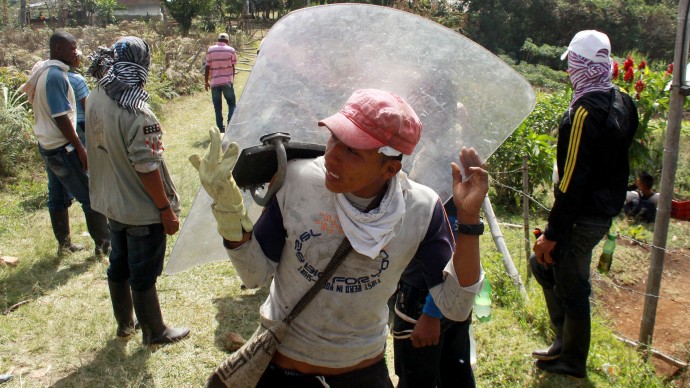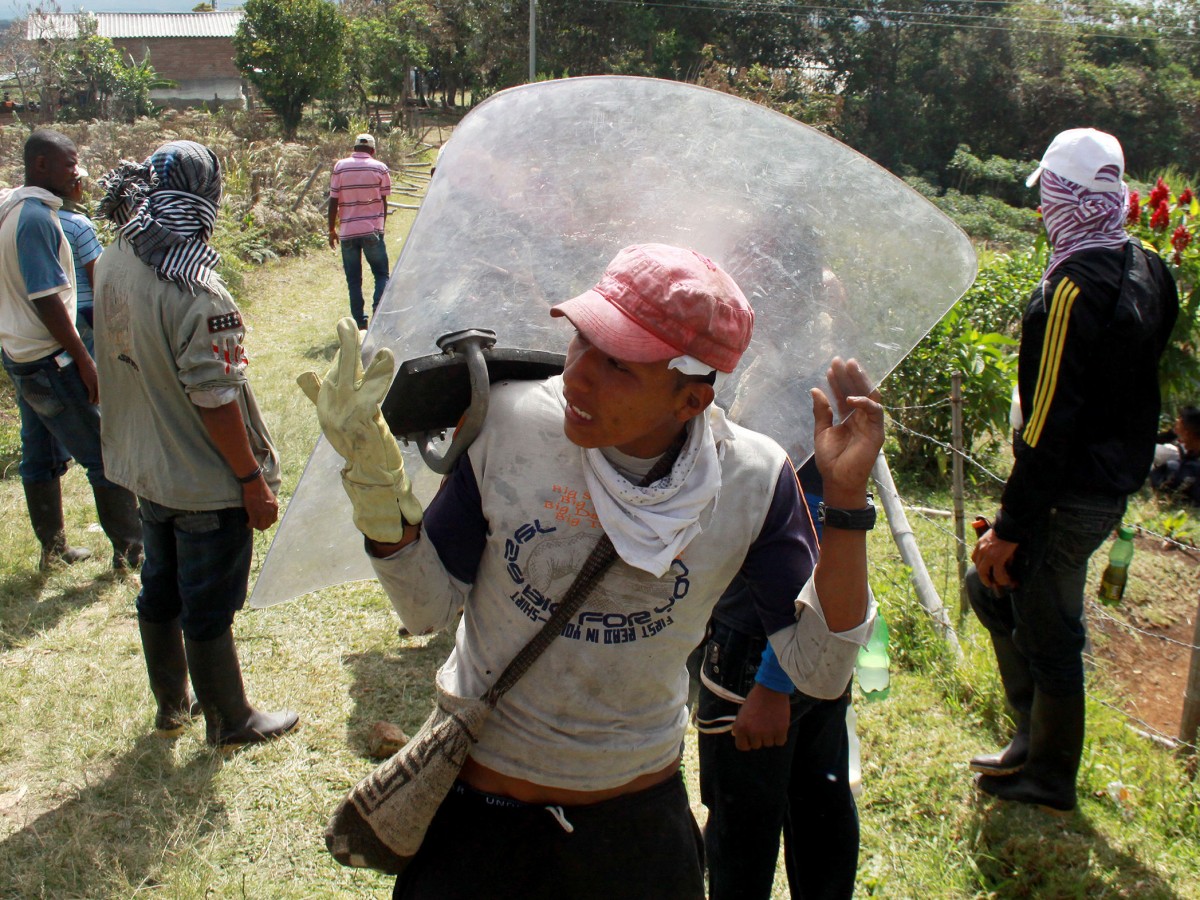
WASHINGTON – Two years after a major free-trade agreement was signed between the United States and Colombia, a key roadmap aimed at cleaning up the latter’s atrocious labor practices is failing on the ground, two members of the U.S. House of Representatives warned this week.
Critics say the experience belies the hope that the U.S. government could oversee rights-related reforms in exchange for trade concessions.
While activists and union leaders in the U.S. and Colombia were initially cautiously optimistic about the U.S.-proposed labor reforms, required under the 2011 free trade agreement, U.S. diplomats now stand accused of not doing enough to ensure the implementation of these prerequisites.
Reps. George Miller (D-Calif.) and James McGovern (D-Mass.), both members of a congressional oversight committee on the issue, recently returned from a fact-finding mission in Colombia aimed at gauging how things had changed for workers and organized labor. But in a report released Tuesday, they warn that reforms have had little impact thus far.
“The Government of Colombia has fallen woefully short of fulfilling its obligations … Many of those who testified before the delegation reported that conditions have worsened since the implementation of the U.S.-Colombia [free trade agreement],” the report states.
“Accordingly, the U.S. Government must re-engage, particularly at the highest level, and make the expansion and enforcement of workers’ rights in Colombia a top priority.”
For years Colombia has been considered one of the most dangerous countries in the world for trade unionists, with 3,000 killed since the mid-1980s. While these deaths and widespread intimidation have taken place in the context of the civil war that has wracked Colombia for decades, labor activists also talk of an all-out assault by business interests.
U.S. corporations have also come under criticism for anti-labor practices in Colombia. General Motors, for instance, remains the target of an unresolved two-year strike by several dozen workers claiming that the company’s Colombian subsidiary illegally fired them after suffering work-related injuries. (The company says the workers were fired for multiple reasons.)
Against this backdrop, when discussions first began in earnest toward a U.S.-Colombia free trade agreement in 2006, they were met with antipathy from liberal lawmakers concerned with the country’s labor record. As such, when Presidents Barack Obama and Juan Manuel Santos finally signed what is formally known as the United States–Colombia Trade Promotion Agreement in 2011, they also agreed to a list of requirements known as the Labor Action Plan (LAP).
The LAP aimed to bring Colombia’s labor practices up to international standards and strengthen the heavily weakened right to organize. The LAP’s provisions were actually meant to be fulfilled before the broader bilateral free trade agreement could go forward, though the latter has now been in effect for a year.
Yet Reps. Miller and McGovern suggest that, beyond some initial steps forward – such as the re-opening of a Labor Ministry and the creation of a reportedly weak investigations unit – the Colombian government has yet to start taking the LAP requirements seriously. (Such trends have been previously reported by watchdog groups, including here and here.)
In fact, in 2012 the number of union members forced to flee their homes actually rose by more than three-quarters over 2011, before the bilateral agreement took effect.
Annihilated movement
Colombia today is one of the most under-unionized countries in the world, with membership of just four percent of workers.
Murders and threats against union members persist “largely unabated,” the representatives found during a mission in August. They report that nearly a thousand death threats have been reported against labor movement members since President Santos came to power in June 2011 – almost simultaneous with the signing of the LAP.
Further, impunity for labor-related infractions – including egregious crimes against union members or simply not collecting fines when actually levied – remains widespread. In cases of violence against union members, more than 90 percent never result in a conviction.
“On this mission, almost every single person with whom we spoke told us that the [LAP] is not being implemented, that the conditions simply haven’t changed,” Gimena Sanchez, a senior associate at the Washington Office on Latin America who accompanied the members of Congress to Colombia in August, told Mint Press News.
“The U.S. government needs to realize that the Colombian government has a tremendous public relations operation around this issue, but that the changes that have been put in place are nearly all cosmetic. It’s time the Congress and [Obama] administration does some independent analysis to get Colombia to meet its agreement.”
Sanchez says that over recent decades the Colombian labor movement has been “annihilated.”
Meanwhile, the Obama administration expressed dismay over continued anti-labor violence in Colombia but says it is continuing to push for adherence to the LAP.
“Full implementation of the Colombia Labor Action Plan is important,” a spokesperson for the U.S. Trade Representative told Mint Press News. “Progress has been made, and challenges remain.”
As examples of that progress, the spokesperson points to the Colombian government’s commitment to carry out “robust inspections” of labor violations, and to incorporate new methods to uncover abusive contracting and improve the enforcement of labor laws. (A broader U.S. government list of recent labor-related reforms in Colombia is available here.)
“However, violence against, and harassment of, trade unionists and labor activists remain a concern, as do uncollected fines and forms of contracting that undermine workers’ rights,” the spokesperson notes. “We have encouraged Colombia to take all measures needed to continue to strengthen protection of workers’ rights and reduce even further threats and violence against unionists.”
While the Colombian embassy in Washington confirmed to Mint Press News that the Colombian Labor Ministry was reviewing the Miller-McGovern report, it was unable to offer a response by deadline.
TPP lessons
Of perhaps the greatest concern is the continued, widespread use of “indirect employment” or subcontracting in Colombia, which has long allowed operations to skirt the potential for unionization. Other practices remain even more blatant. As a result of ingrained racism, for instance, Afro-descendent Colombians are effectively outlawed from organizing, despite often working in some of the most arduous of conditions.
Even as the LAP has thus far failed to achieve its intended reforms, the free trade agreement itself has reportedly worsened conditions for local communities, a longstanding worry on the part of labor activists in the run-up to the signing of the agreement.
“There are multiple areas where the free trade agreement is incentivizing business in areas that remain under dispute, many of which have armed conflict continuing,” Sanchez says.
“Agribusiness fields, the sugar industry – all of these folks are exporting to the United States. Yet the tenure of these lands is often very complicated because for years there’s been a marriage of the legal and illegal, with certain interests using armed forces and leading to the displacement of huge populations.”
She points to the port of Buenaventura, through which some 60 percent of Colombian exports pass and an area targeted for significant development surrounding the free trade agreement. In 2012, as three paramilitary groups fought over control of the lucrative port, violence displaced more than 9,000 people, most of them Afro-Colombians.
“Gruesome violence has taken hold of Buenaventura, and it remains unclear what role Colombian military units – operating with U.S. support – play in the region and its conflicts,” Sanchez says. “You have a massive human rights situation in that area that’s being completely ignored – that’s completely irresponsible.”
The inability of the U.S. government to enforce the diktats of the Labor Action Plan in Colombia could now hold some potent lessons for negotiators involved in ongoing talks toward a massive free trade agreement among a dozen countries around the Pacific Ocean, known as the Trans-Pacific Partnership (TPP).
This U.S.-led initiative would seek to impose similar labor provisions as included in the U.S.-Colombia free trade agreement while including countries such as Vietnam, where labor concerns have spiked. Last year, the U.S. Labor Department downgraded Vietnam to its lowest category in terms of labor rights.
“Before asking Congress to approve another trade agreement, such as the TPP, which poses similar labor and human rights issues, the Administration must first demonstrate concrete and effective improvements in workers’ rights on the ground in Colombia under the LAP,” Reps. Miller and McGovern state in their report.
“Moreover, given the lessons learned in Colombia about the difficulty of ensuring improved labor rights once a [free trade agreement] has been signed into law, it is imperative that the Obama Administration obtain strengthened labor standards and protections in the proposed TPP before the agreement is completed.”


